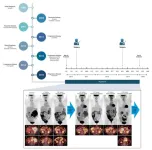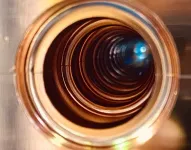(Press-News.org) Highlights
By examining the gene expression patterns of single cells from human fetal kidneys, researchers created a map that demonstrates the trajectories of cell states in the developing kidney and that identifies characteristics associated with kidney diseases.
Results from the study will be presented at ASN Kidney Week 2023 November 1–November 5.
Philadelphia, PA (November 3, 2023) — Scientists have examined the gene expression patterns of single cells from 5 human fetal kidneys to create the most complete atlas of the fetal kidney to date. The research will be presented at ASN Kidney Week 2023 November 1–November 5.
The atlas, which was based on a total of 65,348 cells, demonstrates the trajectories of cell states starting from a progenitor population to mature cell types. By examining properties within this map, investigators identified the transitions between different cell states and defined properties during fetal development that are characteristic of common and rare human genetic diseases.
“We were able to identify cellular transitions and the genes that appear to push toward these transitions, making a map of developmental states and showing that tubular cells are derived from a separate population than podocytes, as has been shown to be the case in mice. We found some paths that had been hypothesized in humans but not clearly shown involving parietal epithelial cells, proximal tubule cells, and podocytes,” said first author Jonathan Levinsohn, MD, PhD, of Children’s Hospital of Philadelphia. “Also, by examining genes involved in rare cases of kidney malformations, we identified cell states that appear to be more likely affected. We also examined heritability of adult kidney traits and found evidence that particular fetal cell states may subtly contribute to kidney health later in life.”
Study: “A Single-Cell Atlas of Human Fetal Kidneys Identifies Cell States Associated with Rare and Common Human Disease”
The world's premier nephrology meeting, ASN Kidney Week, brings together approximately 12,000 kidney professionals from across the world. The largest nephrology meeting provides participants with exciting and challenging opportunities to exchange knowledge, learn the latest scientific and medical advances, and listen to engaging and provocative discussions with leading experts in the field.
About ASN
Since 1966, ASN has been leading the fight to prevent, treat, and cure kidney diseases throughout the world by educating health professionals and scientists, advancing research and innovation, communicating new knowledge and advocating for the highest quality care for patients. ASN has nearly 21,000 members representing 140 countries. For more information, visit www.asn-online.org and follow us on Facebook, X, LinkedIn, and Instagram.
# # #
END
Highlights
Results from the phase 3 SCORED trial indicate that sotagliflozin protects kidney and heart health in individuals with type 2 diabetes and chronic kidney disease.
Results from the study will be presented at ASN Kidney Week 2023 November 1–November 5.
Philadelphia, PA (November 3, 2023) — Sodium-glucose cotransporter-2 (SGLT2) inhibitors, which are medications that lower blood sugar levels among other effects, provide kidney- and heart-related benefits to patients with and without diabetes. An exploratory analysis ...
Alaskans and visitors may be able to see an artificial airglow in the sky created by the High-frequency Active Auroral Research Program during a four-day research campaign that starts Saturday.
Scientists from the University of Alaska Fairbanks, Cornell University, University of Colorado Denver, University of Florida and Georgia Institute of Technology will conduct a variety of experiments at the UAF-operated research site.
The experiments will focus on the ionosphere, the region of the atmosphere between about 30 and 350 miles ...
“The patient was managed with ripretinib and surgical resection of progressing lesions at multiple time points which led to extended clinical benefit.”
BUFFALO, NY- November 3, 2023 – A new case report was published in Oncoscience (Volume 10) on September 20, 2023, entitled, “Multi-disciplinary management of recurrent gastrointestinal stromal tumor harboring KIT exon 11 mutation with the switch-control kinase inhibitor ripretinib and surgery.”
Ripretinib is a tyrosine kinase inhibitor that was approved by the United States FDA in 2020 for treatment of advanced ...
Health happens where people work, live, play and worship, says Prof. Stacey Snelling, chair of the Department of Health Studies in American University’s College of Arts and Sciences. And that’s where the Healthy Schools, Healthy Communities Lab engages children, adults and older adults to tackle health inequities. Snelling received a three-year grant of $2.8 million from Novo Nordisk Inc. for health education and to grow the number of Black farmers producing locally grown fruit and vegetables. The goal is to improve local ...
BOSTON – Ready or not, patients with cancer are increasingly likely to find themselves interacting with artificial intelligence technologies to schedule appointments, monitor their health, learn about their disease and its treatment, find support, and more. In a new paper in JCO Oncology Practice, bioethics researchers at Dana-Farber Cancer Institute call on medical societies, government leaders, clinicians, and researchers to work together to ensure AI-driven healthcare preserves patient autonomy and respects human dignity.
The authors note that while AI has immense potential for expanding access to cancer care and improving the ...
Researchers at Weill Cornell Medicine have led a phase 1 trial of a new drug that delivers potent radiation therapy directly and specifically to cancer cells in patients with advanced prostate cancer. The clinical trial showed that the “radiopharmaceutical” was well tolerated and demonstrated promising antitumor activity, according to a new study published on Nov. 2 in the Journal of Clinical Oncology.
The radiopharmaceutical 225AC-J591 was administered in a single injection and consists of two parts: an antibody that helps find the cancer cells is linked to a molecule that delivers a deadly dose of radiation. Specifically, an antibody named J591 that ...
MINNEAPOLIS/ST. PAUL (11/03/2023) — Research led by the University of Minnesota Medical School identified a new pathway to combat cardiovascular disease. The study was recently published in Nature Cardiovascular Research.
The research team’s work identifies a molecule called TREM2 as a unique and therapeutically relevant pathway for the treatment of atherosclerosis—a common condition that develops when plaque builds up inside arteries—in preclinical models. Atherosclerosis is a primary cause of cardiovascular diseases, which are the number one ...
CHICAGO—November 3, 2023—Illinois Institute of Technology (Illinois Tech) has leased approximately 34,295 square feet in Trammell Crow Company’s (TCC) Fulton Labs innovation hub, announced today by the Chicago office of TCC, a global real estate developer. Illinois Tech will occupy the entire 7th floor of the cutting-edge wet lab facilities at 400 North Aberdeen, aiming to fuel scientific breakthroughs and industry-relevant research as the first academic institution to join the thriving and collaborative innovation ecosystem alongside their Fulton Labs neighbors, which include Portal Innovations and the Chan Zuckerberg BioHub. ...
Ever since the discovery of the Higgs boson in 2012, physicists have wanted to build new particle colliders to better understand the properties of that elusive particle and probe elementary particle physics at ever-higher energy scales.
The trick is, doing so takes energy – a lot of it. A typical collider takes hundreds of megawatts – the equivalent of tens of millions of modern lightbulbs – to operate. That's to say nothing of the energy it takes to build the devices, and it all adds ...
November 3, TORONTO — Scientists at the Ontario Institute for Cancer Research (OICR) have uncovered one way tobacco smoking causes cancer and makes it harder to treat by undermining the body’s anti-cancer safeguards.
Their new study, published today in Science Advances, links tobacco smoking to harmful changes in DNA called ‘stop-gain mutations’ that tell the body to stop making certain proteins before they are fully formed.
They found that these stop-gain mutations were especially prevalent in genes known as ‘tumour-suppressors’, ...


